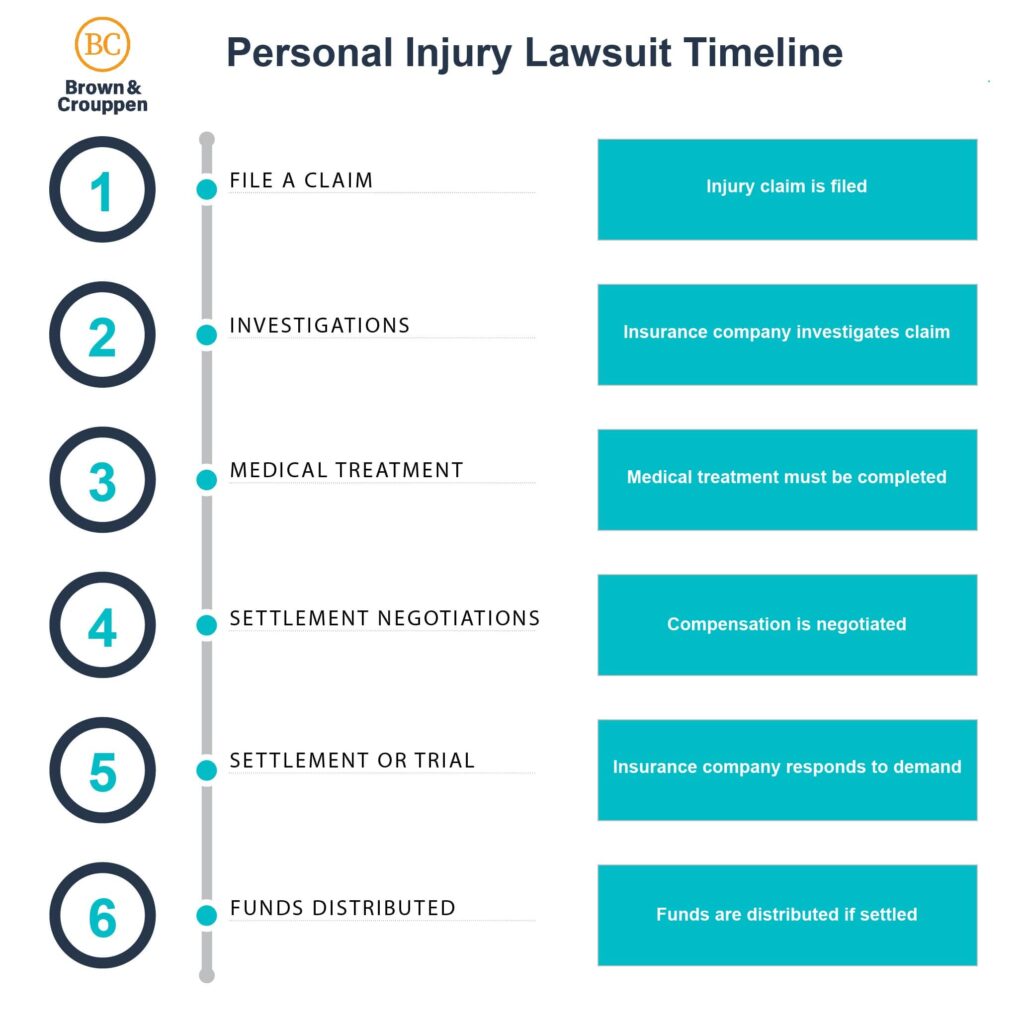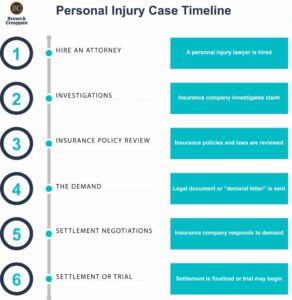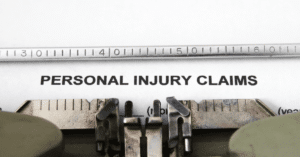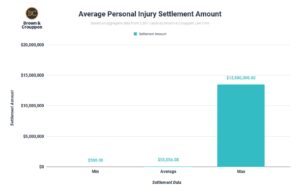Personal Injury Claim Timeline

Claim Filing – The injured party files a claim for compensation with the insurance company of the responsible party. Personal injury cases can involve multiple parties, such as property owners, drivers, or manufacturers. While the terms “claim” and “lawsuit” are often used interchangeably, they are different; a claim is submitted to an insurance company, whereas a lawsuit is filed in court if necessary, following formal discovery and evidence procedures.
Investigation – Both sides investigate the causes and damages associated with the injury. Evidence collection may include police or incident reports, witness statements, medical records, and photos or footage related to the incident. In some cases, attorneys work with specialists to help reconstruct the event. This evidence is essential for building a strong case.
Medical Treatment – The core of a personal injury claim is the injury itself, often requiring medical care that could extend for weeks or months. Depending on the injury’s severity, the treatment process may involve surgeries, therapy, or rehabilitation, with detailed documentation crucial to supporting the claim.
Demand and Negotiation – Once all evidence has been gathered, the personal injury lawyer will issue a demand letter to the insurance company, outlining the compensation sought. This phase often involves negotiations to reach a fair settlement that addresses medical expenses, lost wages, and other damages.
Settlement Agreement – If both sides agree on the settlement terms, attorneys draft legal documents and releases that clearly specify the agreement’s terms. After these documents are signed, the settlement funds are prepared for disbursement.
Disbursement – The settlement funds are then distributed to the injured party, attorneys, and any lien holders, such as medical providers. In some cases, additional liens may be owed to government agencies or workers’ compensation insurers.
Factors That Impact The Timeline Of A Personal Injury Lawsuit
Some claims can be resolved within a few months of completing medical treatment, while others (such as those that involvement more intensive medical treatment) generally take longer. Many variables can affect how long it takes to resolve a personal injury claim.
Here are some of the most common factors that may affect the timeline:
- The type of claim involved: For example, an 18-wheeler accident case may take longer than the average auto accident case to settle due to trucking accident cases generally involving commercial litigation.
- The number of people involved: Multiple plaintiffs or defendants complicate the issues and concerns need to be addressed.
- Whether liability is an issue: Who is at fault is critically important in any personal injury claim. If there are any questions about liability, expect the case to get drawn out.
- The type of insurance coverage involved: Does your case involve personal auto insurance? Or are you dealing with a commercial property policy? An insurance company will be more motivated to defend or delay a million-dollar policy than they are a liability-only state minimum policy.
- The length and type of medical treatment: In a personal injury claim, medical records often serve as evidence of the plaintiff’s injury. Long, complicated treatment will complicate the case, and add to the amount of time the case takes to resolve. If a plaintiff has a medical history that the defendant insurance company wants to argue is a pre-existing condition, the case can get drawn out.
- Claim VS lawsuit: A claim is not a lawsuit. Rather, it is a potential lawsuit. An injured person makes a claim with the party who bears financial responsibility for the negligent conduct, usually an insurance company. The parties can exchange information, negotiate, and settle the case without ever filing any paperwork in court. A lawsuit is a legal filing in court that brings formal accusations against a defendant. Once a lawsuit has been filed in court, the timeline for a case often (but not always) gets longer.A personal injury lawyer must prove all of these elements in order to win their client’s case.
Personal Injury Claim Length By Case Type
| Case Type | Case Length |
|---|---|
| Car Accident | Generally 6 to 12 months, longer if complex |
| Motorcycle Accident | 6 to 12 months, may vary with case specifics |
| Pedestrian Accident | Around 6 to 12 months |
| Truck Accident | 6 months to several years if litigation |
| Dog Bite | Often settles within a few months |
| Medical Malpractice | 1 to 3 years, depending on case complexity |
| Slip and Fall | 6 to 12 months, sometimes longer |
| Workers' Compensation | Typically within 6 months after reaching MMI |
Personal Injury Lawsuit Overview
A personal injury claim or lawsuit consists of another party who acted with negligence (or wrongfully), which caused the injuries of another individual or group of individuals.
In a personal injury claim or lawsuit, a lawyer must be able to prove the other party caused injuries as a result of negligence in order to settle or win a case for their client. There are three elements to this:
- The negligence. Negligence is broadly defined as “the failure to exercise the care that a reasonably prudent person would exercise in like circumstances.” What qualifies as negligence for a specific injury depends on the circumstances of the case. It might be defined by laws or regulations, or it might be defined in the common law (the law of court cases).
- For example, a homeowner who forgets to put away gardening tools and leaves them out where somebody might step on them and get hurt isn’t breaking any laws. The homeowner is not trying to deliberately hurt anybody. They are just being careless.
- On the other hand, a commercial property owner who refuses to repair a dangerous condition, such as crumbling stairs or unstable railings, may be facing more than a claim of ordinary negligence. They may also be violating zoning or municipal ordinances.
- The causation. The injured party must prove that the defendant’s negligence caused their injury.
- Sometimes, causation is obvious, especially for acute or sudden trauma. If you break your leg in a car accident, no credible insurance company will try to argue that your broken leg was a preexisting condition.
- For many claims, however, causation is hotly contested. Have you been having headaches, back cramps, and dizziness since getting rear-ended? Even if they admit fault, the other driver’s insurance company doesn’t have to admit you’re injured. They can (and often do) claim that your symptoms are from something else—your age, your job, your preexisting condition.
- The injury. Personal injury law focuses on the injuries that did happen, not the injuries that might have happened. Leaving a rake on the lawn is careless, but if nobody steps on it, nobody gets injured.
- Your lawyer must prove the element of injury, which includes pain and suffering. An insurance company can (and often will) admit to their insured being at fault. That does not mean they have to admit you were injured.
- Some of the best evidence in an injury claim is the medical records themselves, which show the extent of the injuries and the treatment needed.
- Many people won’t notice pain until several hours or even days after the accident, so we strongly encourage our clients to seek medical attention as soon as possible. The longer it takes you to seek treatment after an accident, the harder it is to prove that your injuries are related to it (which is the causation element).
A personal injury lawyer must prove all of these elements in order to win their client’s case.


Were you injured in an accident due to someone else’s negligence? Get legal help from the most effective injury law firm in the Midwest.
Get Help With A Personal Injury Claim
Here are a few of the ways personal injury lawyers earn their keep:
- We protect our clients from big insurance companies. One of the very first things an experienced personal injury attorney will do is notify the other side that you have a lawyer. Once you are represented, the insurance companies cannot badger you about your injuries.
- We investigate your case while you focus on recovering from your injuries. You should not have to run around town gathering up medical records and tracking down witnesses. That’s our job. We also identify all negligent parties, insurance policies, and anything else the investigation reveals.
- We know that there is more to a personal injury lawsuit than just your medical records. Not every injury has a billing statement attached. You may find yourself unable to remain physically active. Relationships can change, including sexual relationships between married partners. Lost wages need to be calculated, as well as the possibility that you may be unable to work in the future. We look at all of these issues and many more for every client we represent.
- We know when the time has come to file your case in court. The two most common reasons a lawsuit gets filed are these:
- Negotiations have broken down. Sometimes the parties simply cannot come to an agreement.
- The statute of limitations is about to run out. Once that deadline has passed, it is too late to pursue a claim any further. Lawyers sometimes must file a lawsuit to preserve the claim.
As lawyers, we want the best possible outcome for each client. If you have any questions, you should speak with an experienced personal injury attorney. They will be able to evaluate your case and offer advice on your options.
Every personal injury client at Brown & Crouppen gets a legal team with lawyers and paralegals who have years of experience. If you have been injured and you want a free, confidential consultation, call toll-free at 1-888-801-9825 or submit your request online.







